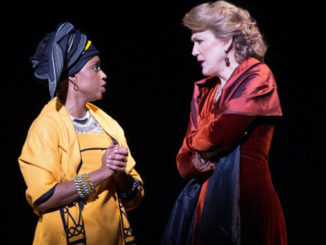Harry Potter and the Cursed Child contemplates what would happen if a character like Harry Potter – or Luke Skywalker, or Wonder Woman, or James Bond for that matter – had a child who did not want to follow in their parent’s footsteps. It’s a fair question: if you were the child of a (super)hero, how would you fare living in your parent’s shadow?
Cursed Child takes that question, and answers it pretty much how you would expect. The story of the next generation of Potterverse characters, including the children of Harry/Ginny, Ron/Hermione, and Draco/Astoria Malfoy, it begins with the pointedly named Albus Severus Potter entering his first year at Hogwarts, and immediately finding it’s not all it’s cracked up to be. Eventually, of course, Albus finds himself thrust into an adventure of the type that made his daddy famous, because what would a Harry Potter play be if not a magical adventure with big evil scary things to vanquish?
It’s also a highly entertaining magical adventure, albeit one that will be vastly easier to follow if you’re a diehard Potterhead, or, as in my case, you bring along your well-informed sister to fill in the gaps.
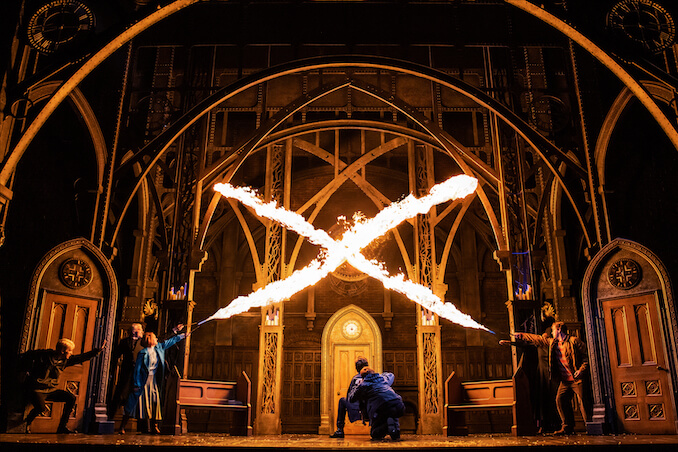
EXPELLIARMUS!
Cursed Child begins with Albus Severus Potter (Luke Kimball) anxiously starting his first year at Hogwarts. He’s desperate to fit in, and, unlike his father before him, not having much luck at all. The play moves too quickly for us to really get a good look at what indignities Albus (don’t call him “Al”!) suffers at the hands of classmates, but it’s clear enough that he’s at best a social pariah and at worst a victim of (mostly offstage) bullying. Enter Rose Weasley (Hailey Lewis) and the fantastically named Scorpius Malfoy (Thomas Mitchell Barnet), the only two classmates who look kindly upon poor Albus. Rose is as goody-goody as her mother Hermione, but Scorpius is, much like Albus, a social outcast burdened by a last name with too much history. (Though in Scorpius’s case, that first name doesn’t do him any favours either.) Soon enough, the begrudging Albus, geeky Scorpius, and cheerful Rose are established as Cursed Child‘s approximation of the “Golden Trio” of the original books – albeit a trio that nobody really likes or trusts.
That’s particularly true for wizard nerd Scorpius, the unexpected – and, I’m sad to report, mildly annoying – beating heart of Cursed Child. It’s Scorpius who, by my count, gets the most stage time of any character, even as the narrative is still extremely Potter-centric. (In a way, not unlike the Skywalker obsession of the Star Wars sequel trilogy.) And while that’s a fine and even interesting narrative choice, actor Thomas Mitchell Barnet badly misplays that geekiness as a bundle of over-exaggerated tics and unnatural speech patterns. It’s the worst kind of geek/nerd cliché, turning Scorpius’s intelligence and genuine passion into the kind of extreme social awkwardness that wouldn’t be out of place in Revenge of the Nerds.
Barnet aside, the cast is mostly fine. Kimball’s Albus grows from angsty child, burdened by overwhelming expectations, into a believable quasi-hero sufficiently distinct that he doesn’t feel like Harry 2.0. Lewis’s Rose is likeable enough, though she gets surprisingly short shrift after being set up as Cursed Child‘s Hermione analogue. Sara Farb as Delphi Diggory oversells most of her scenes, and she could definitely use some accent coaching, but she’s a welcome addition if only because her “half-blood” character is so different from Hogwarts kids we’ve encountered before. The adult versions of Harry (Trevor White), Hermione (Sarah Afful), and Ron (Gregory Prest) all do a great job as older versions of the characters made famous by Daniel Radcliffe and co.
Unfortunately, the real problem with Cursed Child is its plot. Which can best be described as fan service by committee, or, in South Park terms, member berries.
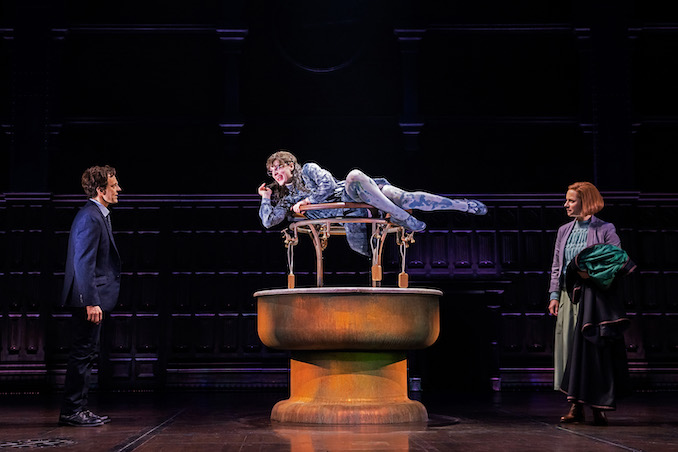
OBLIVIATE!
Back in 2016, South Park‘s twentieth season introduced the concept of “member berries”, as in “remember” berries. These annoyingly talkative anthropomorphic berries spend all their time waxing nostalgic about all those classic pop culture properties that gave rise to our modern media landscape of sequels, reboots, and “legacyquels”. “Member Chewbacca?!”, “Member Jurassic Park?!”, “Member Spock?!” The member berries’ deliberately irritating nature captures a style of lazy screenwriting that confuses audience recognition for fan service, and which thinks that playing the hits – another Death Star! another dinosaur park! – is safer than telling an original story.
Cursed Child often feels like it was written by member berries. Names are dropped faster than Dumbledore at the Astronomy Tower (see what I did there?), and the plot doesn’t so much recreate classic Potter moments as regularly revisit them, beat for beat. Again, Cursed Child isn’t the first legacyquel to be guilty of this – see also: topless beach sports in Top Gun: Maverick – but it’s frustrating that this brand-new story is also a retread of a lot of what’s come before. Judging by my sister’s reactions, even diehard Potter fans will find themselves exhausted by the endless navel-gazing.
Perhaps the most member berry aspect of the script is the decision to have the whole plot turn on a character who’d rank, charitably, ninth or tenth on the list of important Potterverse characters. Had my sister not brought me up to speed, I would have struggled to remember this minor character – who appears in a single Potter movie and a handful of the novels – whose fate is so central to Cursed Child.
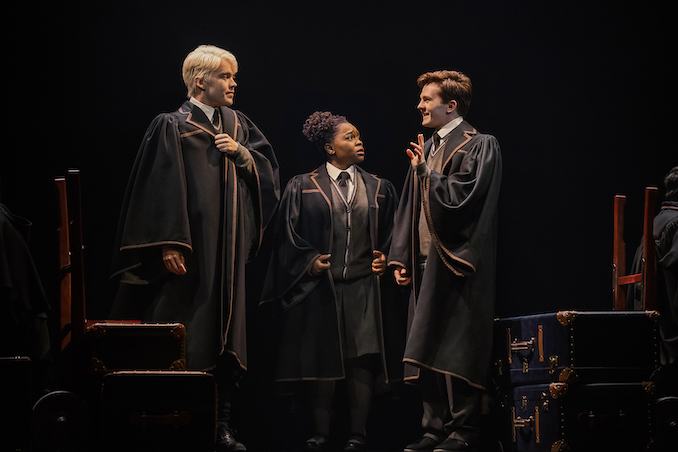
WINGARDIUM LEVIOSA!
I’ve been careful not to spoil the plot of Cursed Child, even though most Potterheads will have likely read the script several times over before the show opens.
In broad strokes, it’s a play about some kids who decide to remedy their parents’ mistakes, via that tried and true method of narratively convenient time travel. In other words, it’s an excuse to revisit several key moments from across the original books, from the perspective of characters who, like the audience, have grown up with the legend of Harry Potter. Potterheads may get teary-eyed seeing beloved characters and scenes recreated live, and even non-fanatics like myself can’t entirely resist the heady dose of nostalgia. Still, it annoys me that Cursed Child is yet another legacyquel with clumsily inserted audience surrogates, and it doubly annoys me that I too allowed the Cursed Child member berries to get to me. Indeed, one of the most insidious things about member berries is that they work so well.
Cursed Child is also, as it should be, the very definition of a theatrical blockbuster. The special effects are amazing and surprising, eliciting audible gasps from the audience. In particular, there’s one recurring time travel effect so brilliant that I regularly missed key lines of dialogue trying to figure out how it works. I would love to talk about all the old fashioned stage magic on display in Cursed Child, but trust me when I say that the special effects are worth the price of admission alone. I expect the show was even more formidable in its original two part, five-hour version, but this truncated three-and-a-half-hour touring production is a worthy substitute.
Speaking of which, even if you weren’t aware the Toronto production is a severe abridgment of the London original, you’d definitely notice the steady clip at which this play moves. Non-Potterheads may struggle to keep pace with all the names and concepts that get bandied about, but at least this half-Cursed Child is wise enough to slow down and dwell on key plot points. I managed to follow the story, but it’s obvious that key things have been lost in the process of reducing the script by half.
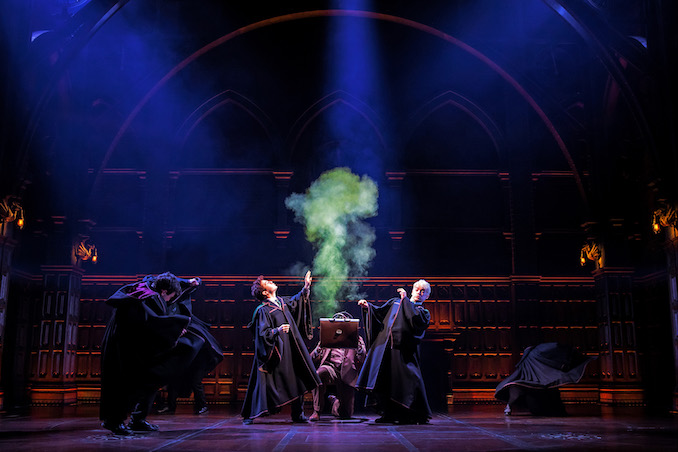
AVADA KEDAVRA!
Cursed Child has some other peculiarities. There’s the Rowling-approved pronunciation of Voldemort – fun fact, the “t” is silent. There’s the terrible interpretive dance sequences that fill the gap during scene transitions (and likely paper over some larger holes in the pared-down script). There’s the needlessly loud stereo system that blasts music so strongly you may need to cover your ears. There’s the (hilariously) ridiculous theatrical flourishes of the stagehands, who’ve been directed to dramatically whoosh their capes any time they cross the stage. There’s the fact that this Potter, while brave enough to cast characters who don’t necessarily look as we remember them, also insists on placing a Maggie Smith-alike in the Professor McGonagall role, while forcing other actors to do mediocre impressions of their cinematic counterparts. There’s also a (minor spoilers) “Palpatine’s Granddaughter” aspect to Cursed Child that is as predictable as it is absurd.
I also have mixed feelings about Cursed Child‘s overtly queerbaiting central relationship (which I will not spoil here). On the one hand, it’s always nice to see a pop culture monolith gesture towards queer inclusion. On the other hand, Cursed Child squanders far too many opportunities to turn its queer subtext into text. This includes, most egregiously, a climactic embrace that was probably written as a kiss before the producers decided it wouldn’t play in Peoria. It’s a slap in the face to a community that J.K. Rowling has had, shall we say, a rather fraught relationship with in recent years. Ah well, at least it gives the fanfic writers something to work with.
Which is probably a good note to end on. If you were to scour the decaying ruins of Tumblr, you probably wouldn’t have to go very far to find a Harry Potter fanfic (or slashfic) involving a new generation of kids named Potter, Weasley, and Malfoy time-travelling to relive their parents’ greatest adventures. True, no member of the fan community has the budget to translate their vision into a $70 million West End/Broadway/Mirvish spectacular – and Cursed Child really is spectacular, I’ll give it that. But it’s also cheesy, and self-congratulatory, and too wrapped up in its own mythos to be called a great play. It is a great show, however, and definitely worth it for the special effects alone.
Much as it pains me to admit it, I ‘member Harry, and he’s still got that magic touch.
*
Harry Potter and the Cursed Child is on now at the Ed Mirvish Theatre (244 Victoria St). Tickets on sale here.



